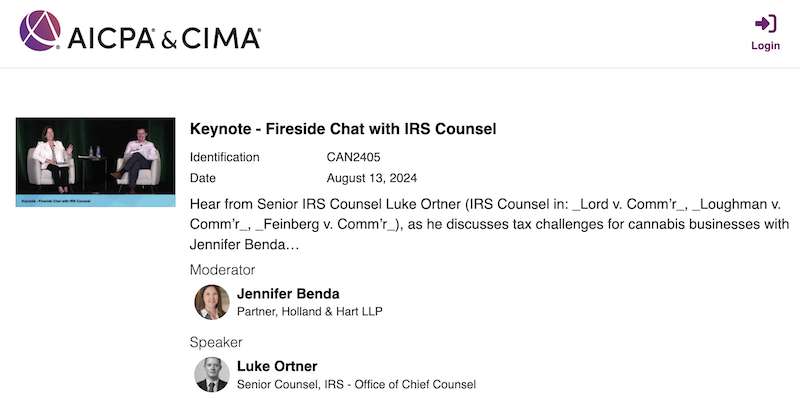Marijuana Moment have picked up on the comments including
The Internal Revenue Service (IRS) will continue to seek tax payments from marijuana companies that have claimed deductions in anticipation of a possible federal rescheduling decision, an attorney with the federal agency says. And if the reform is enacted, he says IRS would theoretically be empowered to seize assets from cannabis companies that don’t pay their dues.
During a fireside chat at the American Institute of Certified Public Accountants (AICPA) cannabis conference in Denver last month, IRS Senior Counsel Luke Ortner discussed potential implications of the Biden administration’s proposal to move marijuana from Schedule I to Schedule III of the Controlled Substances Act (CSA).
Luke Ortner
Senior Counsel, Office of Chief Counsel, Internal Revenue Service
Luke Ortner is a senior counsel with the IRS Office of Chief Counsel where he handles issues and cases involving the cannabis industry, conservation easements, research credit claims, fraud, and various abusive tax avoidance transactions. He is one of the primary coordinators of the IRS’s response to the growing cannabis industry and has tried several cannabis industry cases. He is a graduate of the State University of New York at Geneseo and Duke University School of Law.
While that policy change would free up state-licensed cannabis businesses to take federal tax deductions they’ve long been barred from under and IRS code known as 280E, several major companies have already claimed deductions even as the rulemaking process remains underway.
Watch preview at : https://aicpaconferences.com/p/s/keynote-fireside-chat-with-irs-counsel-92179
For example, in January the multi-state operator Trulieve disclosed receiving a $113 million in 280E refunds it applied for. TerrAscend and Ascend Wellness have similarly said that they’re expecting 280E refunds.
IRS later clarified that the 280E policy still applies until a final rule is issued, and Ortner affirmed that stance during last month’s conference. He added that even if rescheduling is implemented, IRS will “continue to enforce 280E for years prior” to the reform, according to a summary of his talk prepared by the CPA firm Holland & Hart.
“The IRS’s policy is not to look the other way because things have changed going forward,” the firm paraphrased the official as saying during the closed-door chat.
An IRS spokesperson told Marijuana Moment on Monday that the agency conferred with Ortner, who confirmed the accuracy of Holland & Hart’s bullet point descriptions of his commentary.
Read all the detail at





















